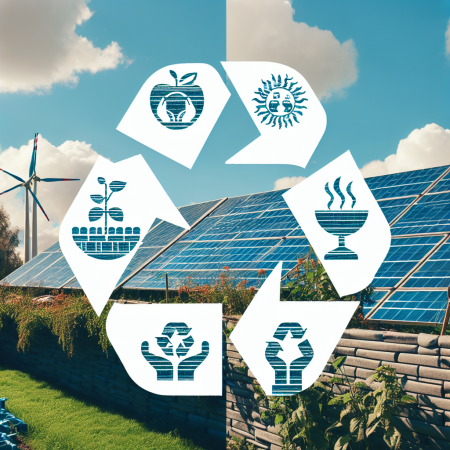Power your momentum by aligning with ethical and sustainable practices in 2025
Embracing a Sustainable Vision
Understanding Sustainability
When I first delved into the world of sustainability, I realized it’s not just a trendy buzzword but a comprehensive way of thinking. It’s about considering our actions’ impact on the planet, society, and economy. The best part? It makes you feel good knowing that you’re contributing to something larger than just your business. Sustainability demands a shift in perspective, and I was all in.
There’s a wealth of resources available to help you understand sustainable practices. They range from environmental protection to social equity. Personally, reading case studies of companies making a difference sparked a fire in me—if they can do it, so can I!
Ultimately, aligning your vision with sustainable practices means crafting a roadmap where both business and eco-consciousness coexist harmoniously. This is where your momentum truly starts to build.
Building Ethical Supply Chains
Choosing Responsible Partners
One of the biggest eye-openers for me was the importance of my supply chain. I learned that choosing ethically responsible partners is crucial. Not only does it reflect your brand’s ethos, but it also affects how consumers perceive your company. In my journey, I started seeking suppliers that share similar values regarding labor rights and environmental sustainability.
I found that asking potential partners about their practices upfront made a huge difference. It’s amazing how many suppliers are eager to share their commitment to ethical processes. You’ll be surprised by how much more engagement you can create when your supply chain reflects your core values.
Remember, your ethical stance becomes a part of your brand story. A solid commitment to working with like-minded partners can differentiate you in the crowded market while building consumer trust.
Empowering Employee Engagement
Creating a Culture of Sustainability
When I talk about sustainability in business, I cannot stress enough how critical employee engagement is. Creating a culture that promotes sustainability isn’t just a perk; it’s a necessity. I witnessed firsthand how excited my team became once they recognized our commitment to ethical practices. Their enthusiasm was contagious!
One effective strategy was launching an initiative where employees could volunteer for sustainability projects. This not only contributed positively to our community but also instilled a sense of pride and participation among my staff. The energy within the workplace shifted in a beautifully positive direction.
As leaders, it’s our job to encourage and foster discussions around sustainability. Open dialogue and brainstorming sessions can lead to innovative ideas and inspire more green practices within your organization.
Innovating Eco-Friendly Products
Researching Sustainable Materials
In my quest for ethical practices, I embarked on a journey to innovate eco-friendly products. I dove deep into researching sustainable materials—what works, what doesn’t, and which suppliers are committed to the same principles as me. I was genuinely amazed at the variety of options available. No longer do we have to settle for conventional materials that harm the environment!
The cool thing about creating eco-friendly products is that it naturally attracts a demographic that cares. People are becoming increasingly aware of their purchasing decisions and are on the lookout for brands that align with their values. I found that once I made eco-conscious innovations, sales naturally followed.
Not only did our product line become more sustainable, but it also sparked conversations with customers. They were eager to learn and share their own journeys. This engagement fosters loyalty as consumers feel like they’re part of a movement.
Advocating for Social Responsibility
Community Involvement and Impact
Lastly, advocating for social responsibility is so integral to the fabric of a truly ethical business. I always believed that giving back to the community is not just the right thing to do but also a smart business move. By aligning our brand with local initiatives, our company became a part of the community’s heartbeat.
We started by identifying local organizations that align with our values. Volunteer days, fundraising events, and sponsorships made a huge impact—not just for others but for our brand image, too. The team bonding experience during these events highlighted our commitment to social responsibility.
Customers increasingly want to see tangible results of a brand’s social responsibility efforts rather than just hear about them. Transparency and storytelling became critical in showcasing our contributions, which only served to deepen the connection consumers felt with our brand.
Frequently Asked Questions
1. Why is sustainability important for businesses?
Sustainability is crucial for businesses as it not only helps protect the environment but also attracts consumers who prefer to support eco-conscious brands. It fosters a positive brand image and can lead to increased customer loyalty.
2. How can I find ethical suppliers?
Start by researching and asking potential suppliers about their practices regarding labor rights and sustainability issues. Look for certifications that validate their claims, and don’t hesitate to reach out to past clients for feedback.
3. What role do employees play in sustainable practices?
Employees are pivotal in driving sustainability initiatives. When engaged and informed, they can contribute innovative ideas and champion company values. Their enthusiasm can create a ripple effect, fostering a culture of sustainability.
4. How can we measure the impact of our sustainable initiatives?
Measuring the impact of sustainable initiatives can be done by setting clear, quantifiable goals from the start. Track progress against these benchmarks, survey employees and customers for feedback, and be open about your ongoing journey.
5. Can small businesses implement sustainable practices too?
Absolutely! Sustainable practices are scalable. Small businesses can start with small actionable steps, like sourcing local materials or reducing waste. Every effort counts and can lead to substantial change over time.


